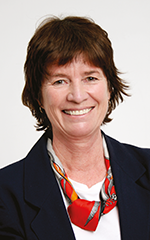

In our new AI-generated world it was inevitable that the Nobel Committee would have noticed. And last November two pioneers of artificial intelligence, John Hopfield and Geoffrey Hinton, won the Nobel Prize in physics. The purists huffed and puffed about “a Nobel prize in physics for something that is not physics”; but back in the 1980s these two scientists helped to create the building blocks of machine learning. This has revolutionised the way we work and live, and also brought new threats to our society. Their story is fascinating.
Applying methods from the field of physics, they did their crucial work in the early 1980s at a time when computer hardware was unable to take full advantage of their insight. Hopfield pioneered artificial neural networks. These are interconnected computer nodes inspired by neurons in the human brain. Hinton is known as the godfather of artificial intelligence. His contribution was to use an algorithm known as backpropagation – whatever that is – for machines to train neural networks and boost their learning ability by letting them work in three dimensions. This allowed them to learn by fine-tuning errors until they disappeared, similar to the way a student learns.
Creativity comes from everywhere, and Hinton had an unlikely background as a psychologist who was curious about how the mind works, while also dabbling in carpentry. His colleagues talk about his playfulness and genuine interest in answering fundamental questions. They say he keeps trying out crazy things, and some of them work very well and some don’t. But they have all contributed to the success of the field and inspired other researchers to try new things as well. Brilliant as his mind is, I like Hinton’s down to earth description of GPT-4 as a useful but not very good expert that can hallucinate.
Both of them worry about possible bad consequences, the threat of systems more intelligent than us eventually taking control, and whether these will act in an ethical way. Hinton gave up his position at Google so he could speak more freely about the dangers of the technology he helped create, and Hopfield signed early petitions by researchers calling for strong control of the technology.
I recently came across a good example. Two Harvard students have demonstrated how to take images from a pair of smart glasses and use facial recognition software to quickly reveal people’s identities, phone numbers and addresses. The most disturbing part is that their idea uses current, widely available technology available with Ray-Ban Meta smart glasses and public databases.
They did this by using the ability of the smart glasses to livestream video to Instagram. A computer program monitors this stream and uses AI to identify the faces. The photos are then fed into public databases to find names, addresses, phone numbers and even relatives. The information is then instantly fed back through a phone app.
In their video the students use the glasses to identify classmates, their addresses, and names of relatives in real time. Even more disturbing is the one where, based on the information from the app, they are shown chatting up complete strangers on public transport and pretending that they know them.
Facial recognition technology has been frighteningly accurate for a while, and is routinely used to help law enforcement. I am often amazed how it can recognise my face through the car window when I drive into a complex. The students basically just pulled together a bunch of existing technologies. What’s new is that it is being paired with a consumer gadget that is easy to access, and filming is almost undetectable.
The Ray-Ban Meta glasses used in their demonstration look just like any other pair of Ray-Bans. You can get them on Amazon.com for $299. Ray-Ban says that with just a few words the smart glasses can make calls, send texts, control features and quickly find answers for random questions. The scary part about this one is that people often don’t notice when you’re filming, especially in crowded public spaces.
Privacy has always been a major concern with smart glasses. Google Glass experienced a backlash at people being recorded without consent in public spaces. However, people have become more accustomed to being filmed as a result of the rise of smartphones, vloggers and TikTok. The students explain that the purpose of building the tool was not for misuse, and they are not releasing it. Their goal is just to raise awareness of what is possible today with existing technology.
I am not convinced. There is no way this is going to stay under wraps, and the implications are terrifying.
| Tel: | +27 11 543 5800 |
| Email: | [email protected] |
| www: | www.technews.co.za |
| Articles: | More information and articles about Technews Publishing (SA Instrumentation & Control) |

© Technews Publishing (Pty) Ltd | All Rights Reserved